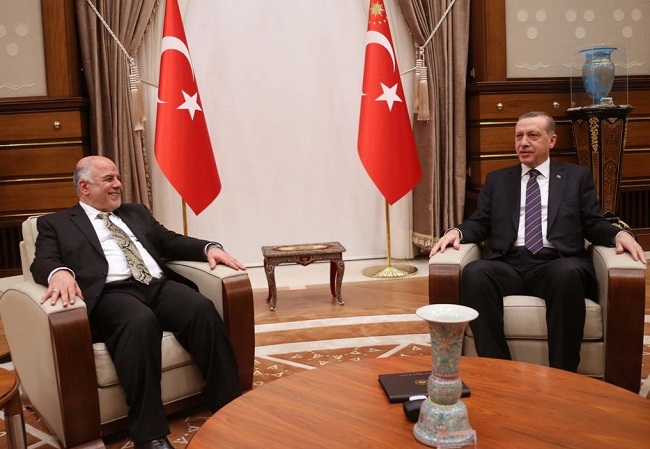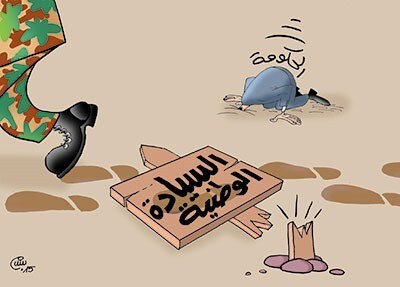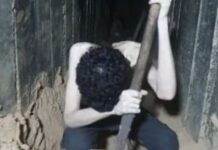On December 5, 2015, media reported that 150 Turkish soldiers had entered Iraqi territory with 20-25 tanks, that were then deployed at a Turkish military base located inside Iraq near the city of Mosul, which had been captured some 18 months previously by the Islamic State (ISIS). In light of these reports, the Iraqi government quickly condemned the violation of its sovereignty, threatening to appeal to the UN Security Council for a resolution demanding that Turkey withdraw all its forces from Iraq.[1] Iraqi Shi’ite militia leaders joined the Iraqi government’s demands, even threatening that if Turkey did not withdraw, they would not hesitate to use force against it.[2] Concurrently, Shi’ite militia supporters in Iraq launched protests against the Turkish presence in the country.[3]
For its part, Turkey said that its military presence in Iraq was not new, and had begun in late 2014 in coordination with the Iraqi government. According to Turkey, its soldiers are in Iraq to assist in training, instructing, and advising Iraqi security forces and Kurdish Peshmerga forces in the struggle against ISIS, as part of the international coalition to fight it.[4] Turkish President Recep Tayyip Erdogan stated in a December 27, 2015 interview with Al-Arabiya TV that Iraqi Prime Minister Haider Al-‘Abadi had personally requested military aid from Turkey during his visit there shortly after Mosul’s capture by ISIS. According to Erdogan, Iraqi officials, including the defense minister, even visited one of the Turkish bases in Iraq, observed the activity there, and expressed their satisfaction with it.[5] Also, according to Turkey, its soldiers’ recent entry into Iraq, as reported by media, was merely part of standard troop rotation.[6]

Turkey’s version of events was supported by elements in Iraq, mostly Kurdish politicians who said that the Turkish presence, at least in autonomous Kurdistan, was with Kurdish consent. A Kurdistan government spokesman issued a statement saying that «as part of the cooperation with the international anti-terrorism coalition, the Turkish government opened two training bases late last year [2014], one in Erbil and one in Sulaymaniyah, in order to train Peshmerga forces. At the same time, another center for training Iraqi forces was established near Mosul…»[7] Former Nineveh governor Atheel Al-Nujaifi also stated that the Turkish presence in the country was coordinated with the Iraqi authorities.[8]
However, despite these claims, Iraqi Prime Minister Al-‘Abadi reiterated his demand that Turkey immediately withdraw from Iraq, and the Iraqi representative to the UN asked the Security Council to discuss Turkey’s violation of Iraqi sovereignty. Beginning on December 14, 2015, Arab media featured reports, confirmed by the Turkish Foreign Ministry, of a gradual pullout of Turkish forces from the Mosul area. However, Turkey stressed that this was not a withdrawal, but rather a redeployment of forces on the ground, and that it had no intention of withdrawing its troops from the country.[9] In response to Turkey’s statements, Iraq demanded that the Arab League foreign ministers meet to discuss the Turkish incursion into its territory and force it to withdraw. Iraqi Foreign Minister Ibrahim Al-Ja’afari also did not rule out the possibility of the use of military force against Turkey, leading Turkish Prime Minister Ahmet Davutoglu, to cynically suggest that he focus his military efforts on fighting ISIS.[10]
The London-based Qatari daily Al-Quds Al-Arabi cited sources in Iraq who assessed that the tension with Turkey was the result of Turkey-Russia tension stemming from Turkey’s November 2015 downing of the Russian jet.[11] This crisis is also manifested in Russia’s and Iran’s increasingly harsh rhetoric against Turkey, and, according to the sources, this tension could sour Iraq-Turkey relations to the point where they sever all ties with each other.[12] Conversely, the Lebanese daily Al-Akhbar cited a source that rejected Turkey’s explanations regarding its incursion into Iraq, claiming that the move was not meant to help Iraq but rather to pressure it to allow a Qatar-Turkey gas pipeline to be laid in its territory.[13]
The Iraqi press, primarily its pro-Iran outlets, published articles harshly attacking Turkey and Erdogan. They claimed, inter alia, that Turkey is seeking to restore its Ottoman-era control of Iraq, that it supports ISIS, and that it seeks to plunder Iraqi oil. One article even called Erdogan «Satan.»[14]
Alongside opinion pieces expressing Iraqi rage at Turkey and reflecting the tension between the countries, the Turkish incursion also provided a opportunity for some writers to express their general opposition to any foreign intervention in their country. These writers stressed that throughout history Iraq had been squeezed between the two empires of Iran and Turkey, and called for adhering to the uniquely Iraqi identity and resisting the sectarianism associated with ties to any patron superpower.
This report will review some of the articles in the Iraqi press expressing rejection of any foreign intervention in the country:
Iraqi MP: Iraq Should «Strike Any Foreign Force Entering Its Territory»
Serwa ‘Abd Al-Wahid, an Iraqi MP from the Kurdish Change (Gorran) Movement, published an article in the daily Al-Zaman harshly attacking Turkey for invading Iraq. She claimed that Turkey was treating Iraq as if it were still part of the Ottoman Empire, and did not hesitate to criticize the Kurdistan government for allowing a Turkish presence in the region without the consent of the Kurdish parliament. She added that Iraq should fight any foreign element that invades it, not just Turkey.
She wrote: «A lack of decisive steps by the central [Iraqi] government and the [Kurdistan] regional government against the violation of [the sovereignty of] Kurdish territory in Iraqi Kurdistan will open the door to additional foreign intervention, which will harm Iraqi sovereignty and exact a high price from our people. This invasion into Iraqi territory is part of a plot to violate Iraqi sovereignty, and remaining silent about it will constitute acceptance of this reality, as is happening with the Iranian presence in Iraq. The government must not settle for issuing a stern statement [condemning the invasion], but must implement its threat and strike any foreign force entering its territory. Respecting Iraqi authorities means preserving the sanctities of the country, and land is the most sacred [thing] of all.»[15]

Iraqi Columnist: Foreign Intervention By Any Country Will Harm Iraq; We Should Rely Only On Ourselves
Muhammad Jarrad, a columnist for the Iraqi daily Al-Sabah, called on Iraqis to abandon their loyalty to either Sunni or Shi’ite and to unite against ISIS themselves, instead of relying on foreign forces to fight it: «We should be upfront and [acknowledge] that the Iraqi sides are divided amongst themselves regarding the entry of foreign forces, in the same way that they are divided on the issue of supporting the international [anti-ISIS] coalition to which these forces are connected. Some believe that the Russian-Iranian coalition is the most serious in fighting ISIS and the terrorist organizations, whereas the rest pin their hopes on the Western-American coalition that is supported by some Arab Gulf states. Some [Iraqis] are motivated by a despicable sectarian worldview that causes them to place their narrow interests above the interest of Iraq, its national sovereignty, and its territorial integrity.
«It is our duty to address an important truth, namely that an incursion by the ground troops of any foreign country will cause [that country] to impose [on Iraq] an international and regional script that serves its own interests without considering Iraq’s interests and unity. Everyone must know that Iraq can defeat [ISIS] only if all its sons cooperate and thwart the possibility of foreign intervention. For this purpose, the residents of regions occupied by ISIS should rely on security forces, the heroes of Shi’ite militias, and the Iraqi Sunni tribesmen to liberate their cities. The residents of these areas should play an active role in maintaining the liberated areas and overseeing the borders, and in attacking ISIS hotbeds, rather than relying on American and Arab guarantees to liberate their cities.»[16]
Iraqi Columnist: Iraq Has Been Trapped Between Iran And Turkey For Centuries, And Has Suffered Greatly For It
Dr. Sa’d Al-‘Ubaidi, also a columnist for Al-Sabah, stressed that throughout history Iraq has been trapped between the Iranian hammer and the Turkish anvil, and that these powers have fought with each other for influence in Iraq, with the Iraqis stuck in the middle. He wrote: «Before Iraq’s founding as a country in 1921, it was an arena of conflict between the Persian and Ottoman empires, each of which exerted its influence on it, with Iraq’s sons as the true victims [of this conflict] and serving as fuel for it. The influential party [either Persian or Ottoman] tended to lean on some [Iraqis] and saw them as subordinate to it, convincing them that it relied on them to hold [public] office and to collect monies, and as a means of controlling and taking vengeance on the other part of the country. Thus, throughout the era of the struggle between these two empires, the Iraqi people as a whole lost its security, stability, and growth.
«This struggle remained ongoing even after the founding [of the Iraqi state], and the new Iraq is still an arena in which both sides, Iran and Turkey, are interested… The Turkish military incursion into northern Mosul has proven this reality, and the controversial popular response to it and to the Iranian presence have further confirmed it. This indicates that the efforts [by Iran and Turkey] to worsen [the situation in Iraq] so as to serve the interests of these two countries and to further their efforts to expand their influence on Iraqi soil, in a way that does not serve the entirety of the Iraqi people, who are fated to fight each other as representatives [of these two countries]…»[17]
Endnotes:
[1] Al-Quds Al-Arabi (London), December 7, 2015.
[2] Elaph.com, December 7, 2015.
[3] Al-Hayat (London), December 12, 2015.
[4] Al-Quds Al-Arabi (London), December 5, 2015.
[5] Ara.tv, December 27, 2015.
[6] Al-Quds Al-Arabi (London), December 5, 2015.
[7] Al-Quds Al-Arabi (London), December 5, 2015.
[8] Al-Quds Al-Arabi (London), December 6, 2015.
[9] Ara.tv, December 14, 2015.
[10] Burathanews.com, December 25, 2015.
[11] See MEMRI Inquiry and Analysis No. 1208, The Sultan vs The Tsar: The 21st-Century Round – The Clash Of Imperial Ambitions For Regional Hegemony, December 10, 2015.
[12] Al-Quds Al-Arabi (London), December 12, 2015.
[13] Al-Akhbar (Lebanon), December 7, 2015.
[14] Burathanews.com, December 12, 2015.
[15] Al-Zaman (Iraq), December 8, 2015.
[16] Al-Sabah (Iraq), December 10, 2015.
[17] Al-Sabah (Iraq), December 14, 2015.









